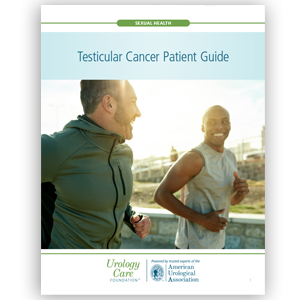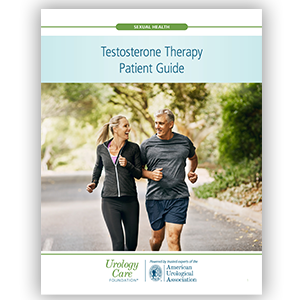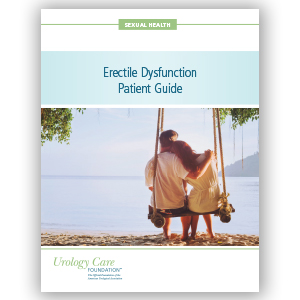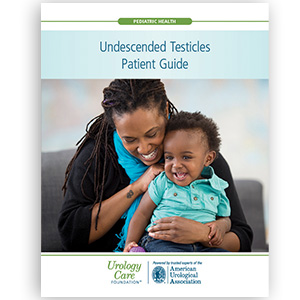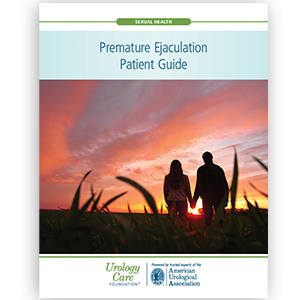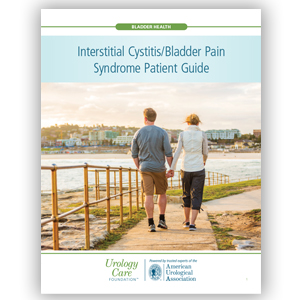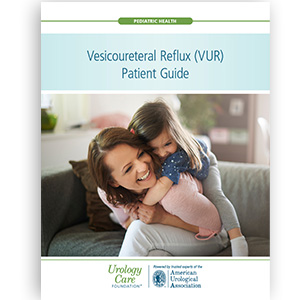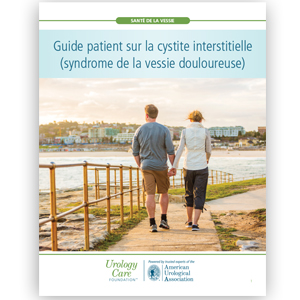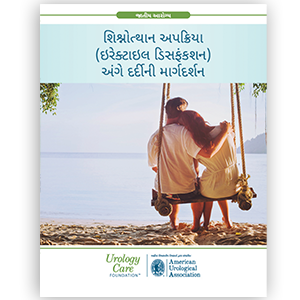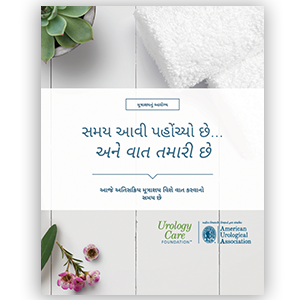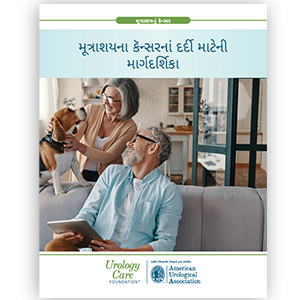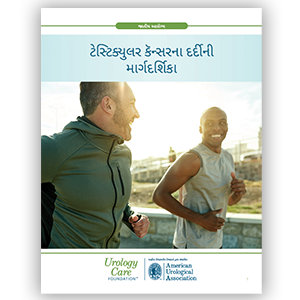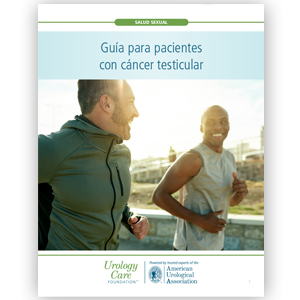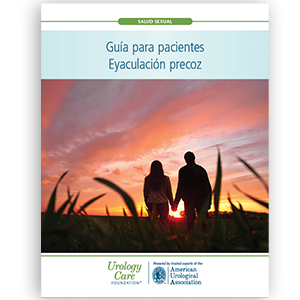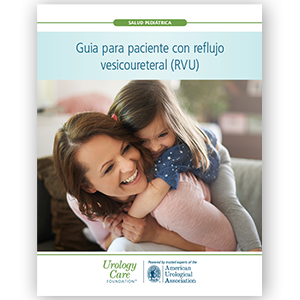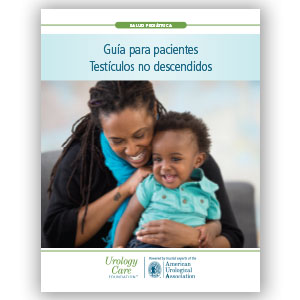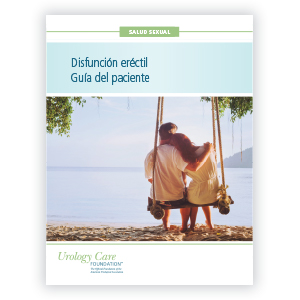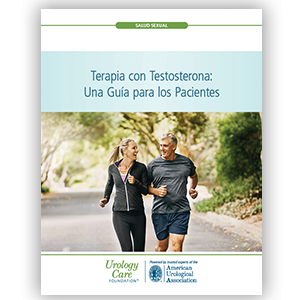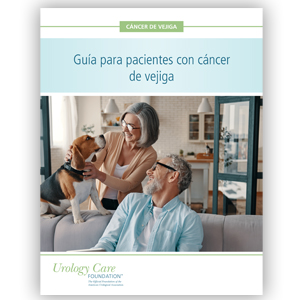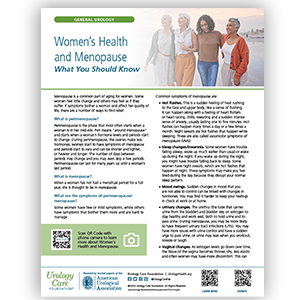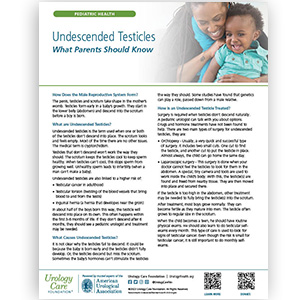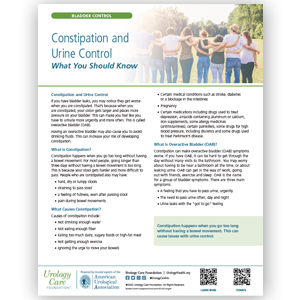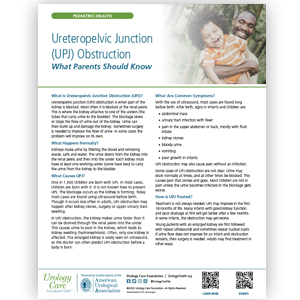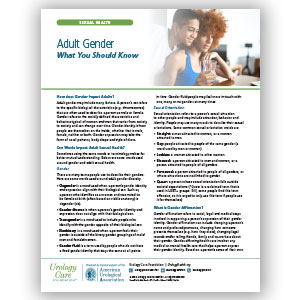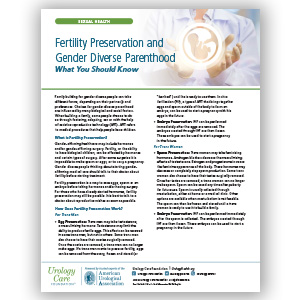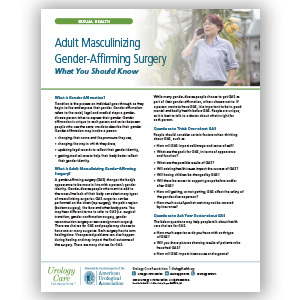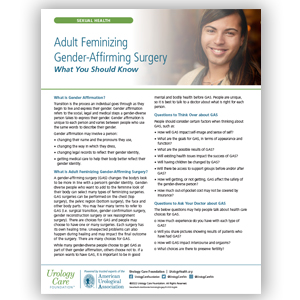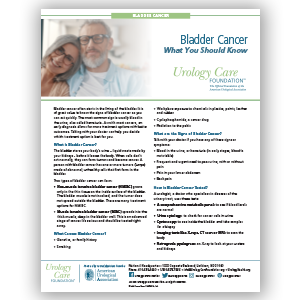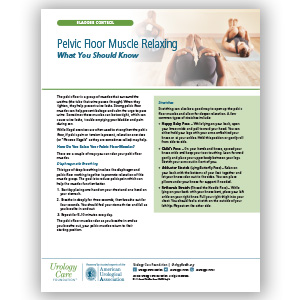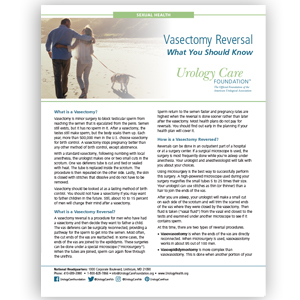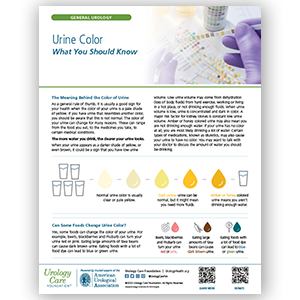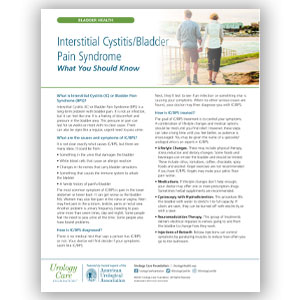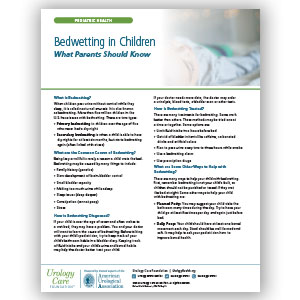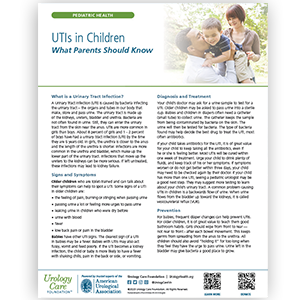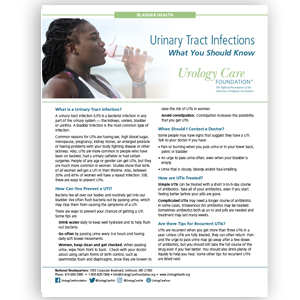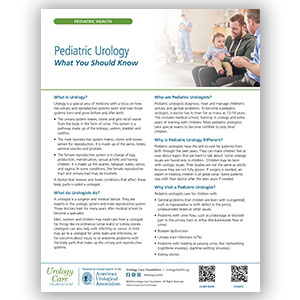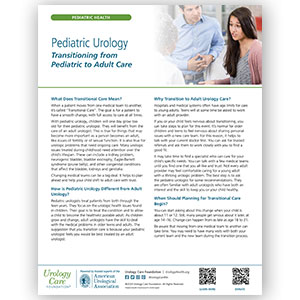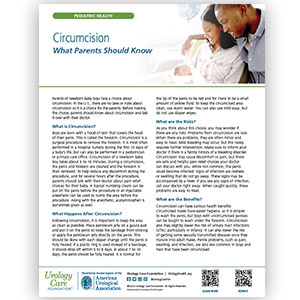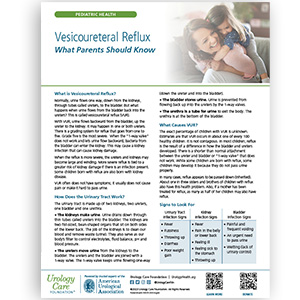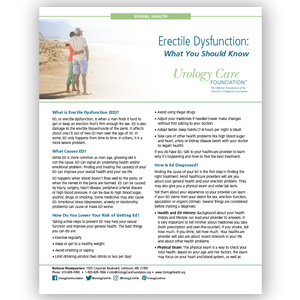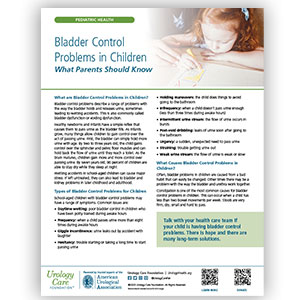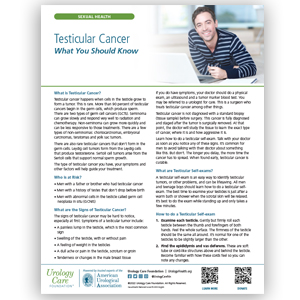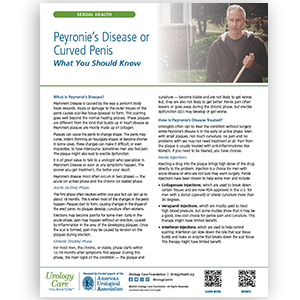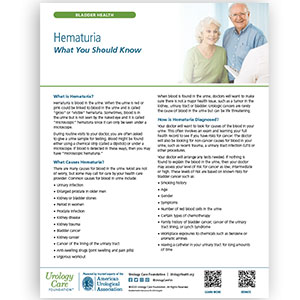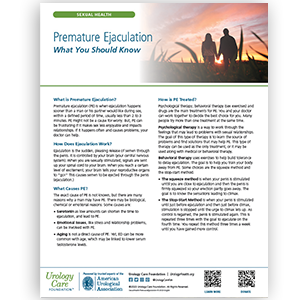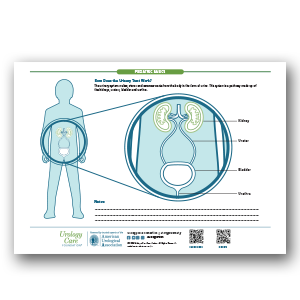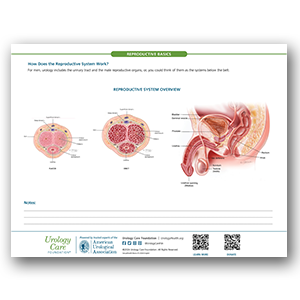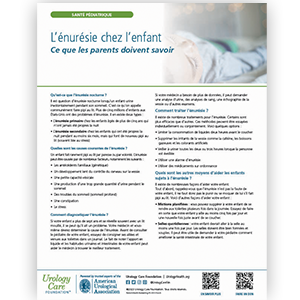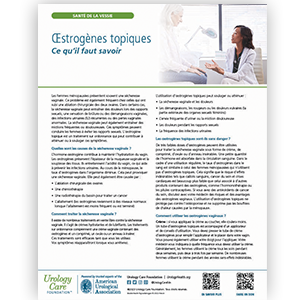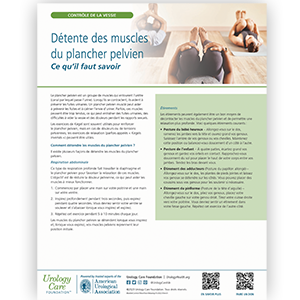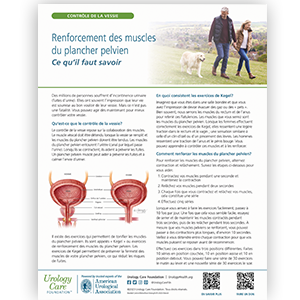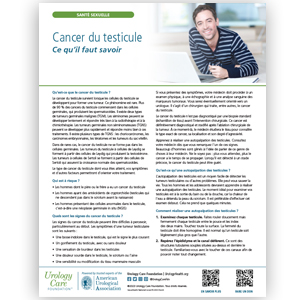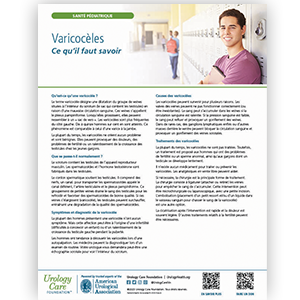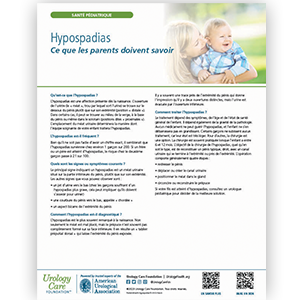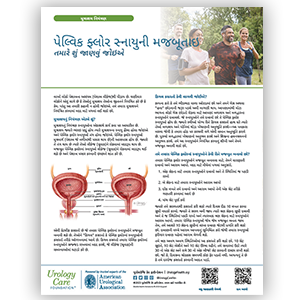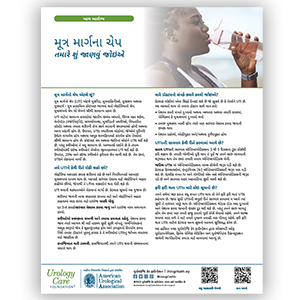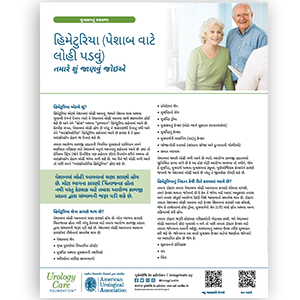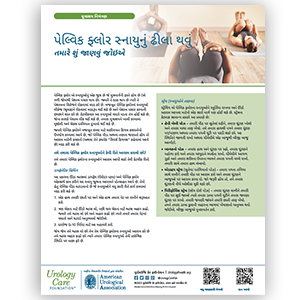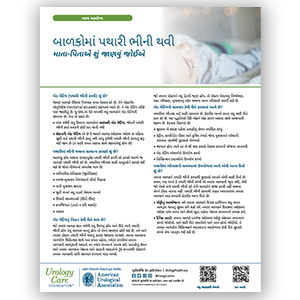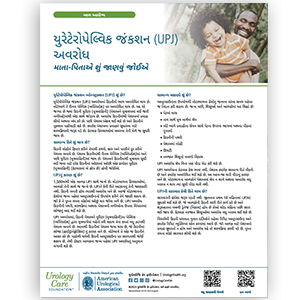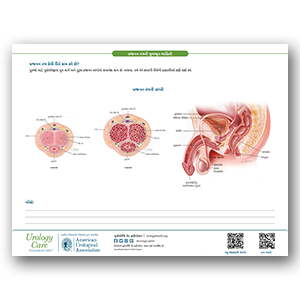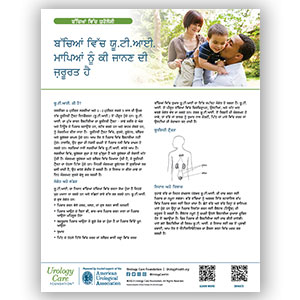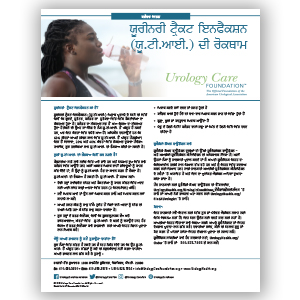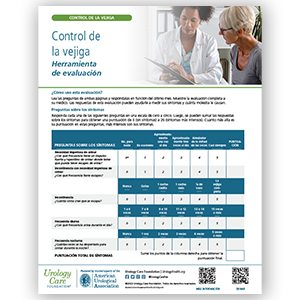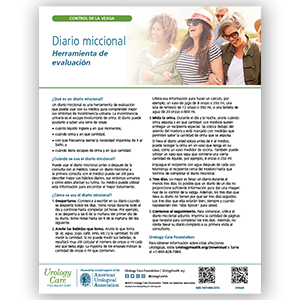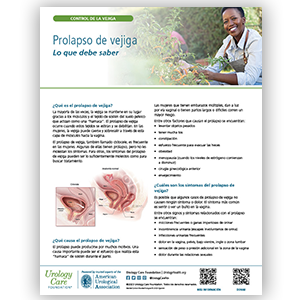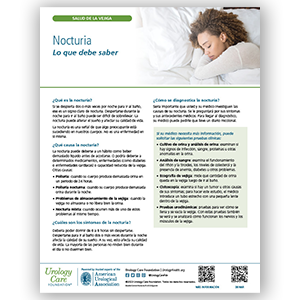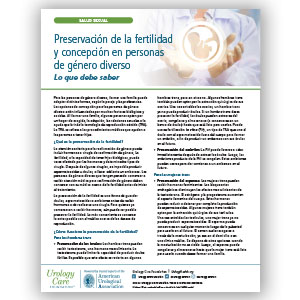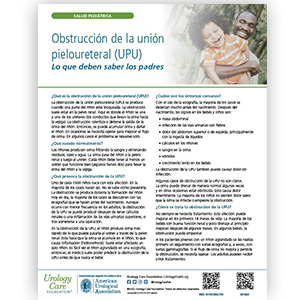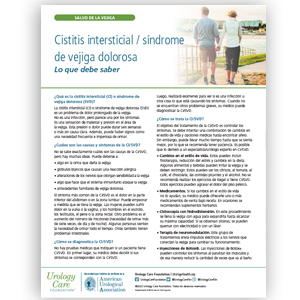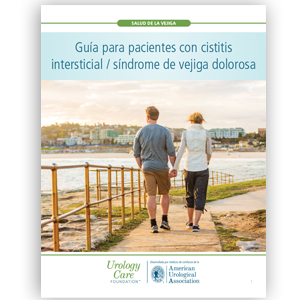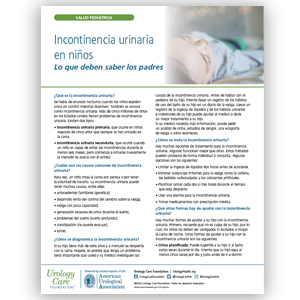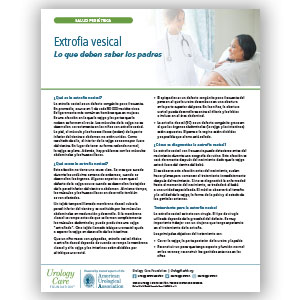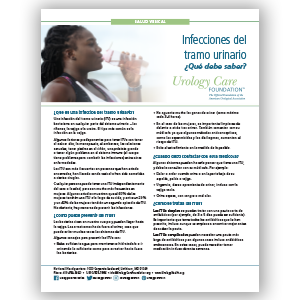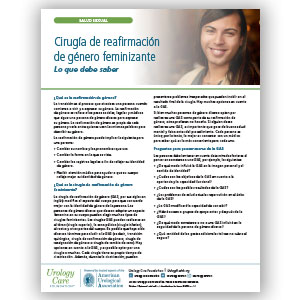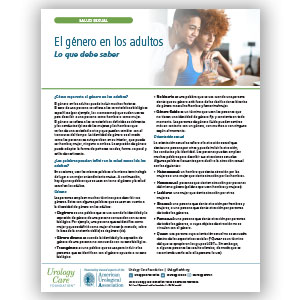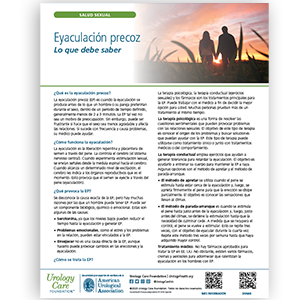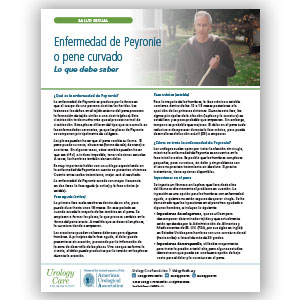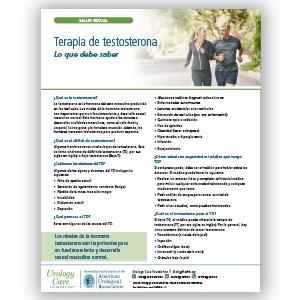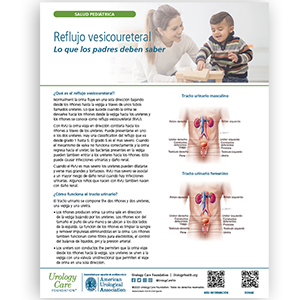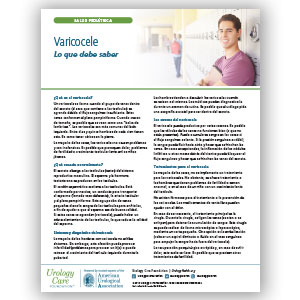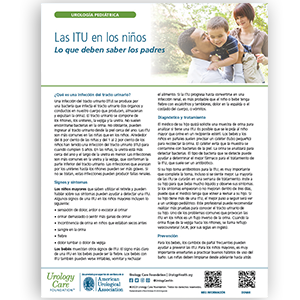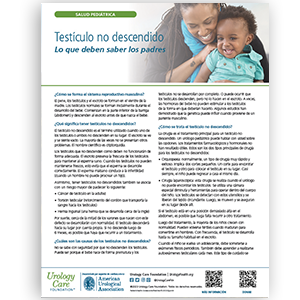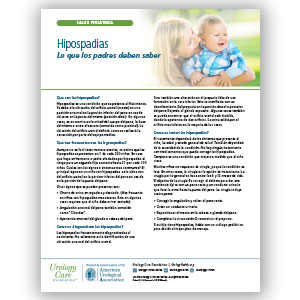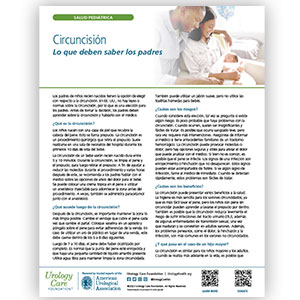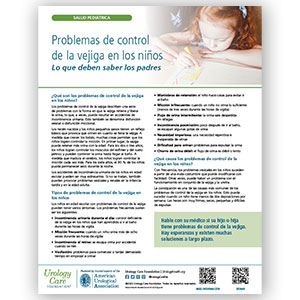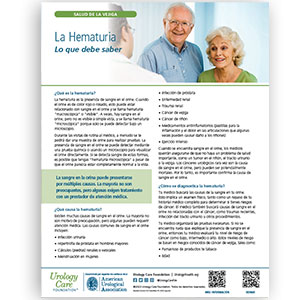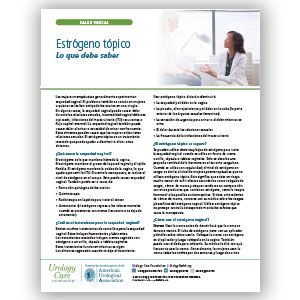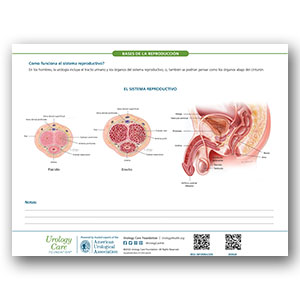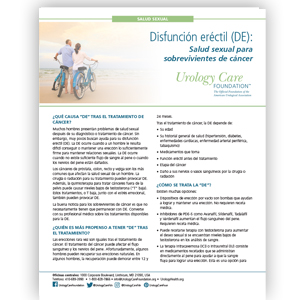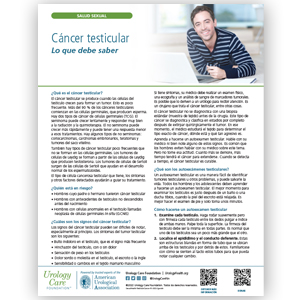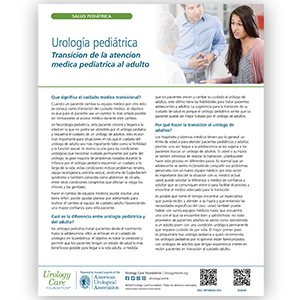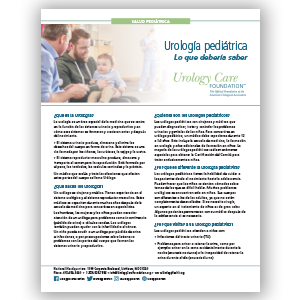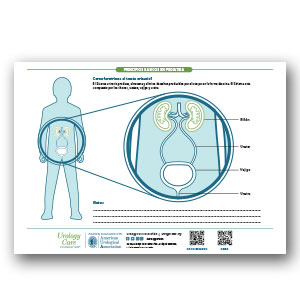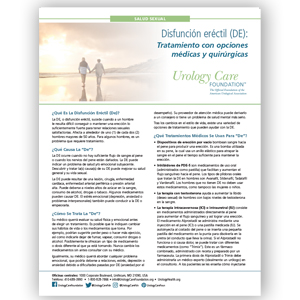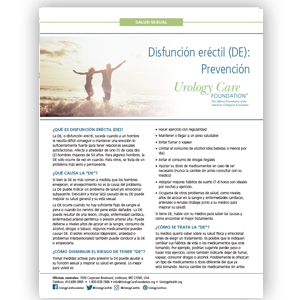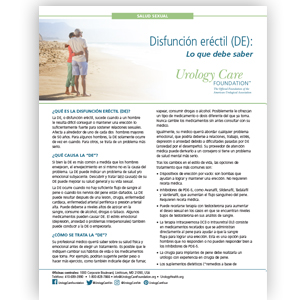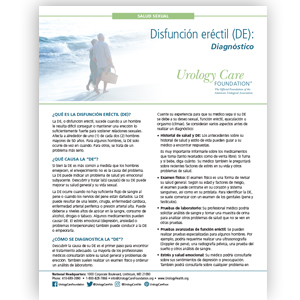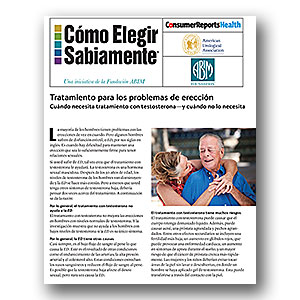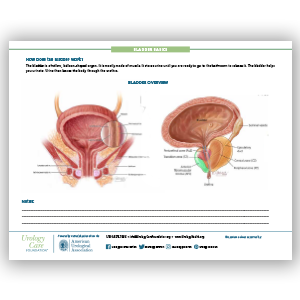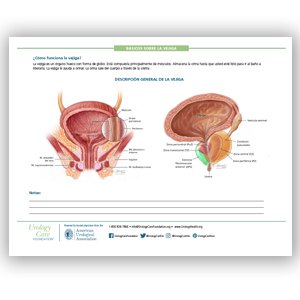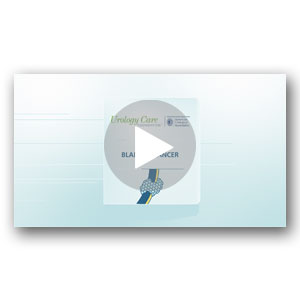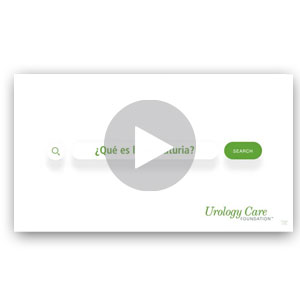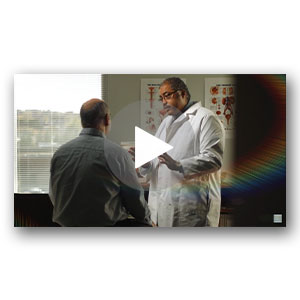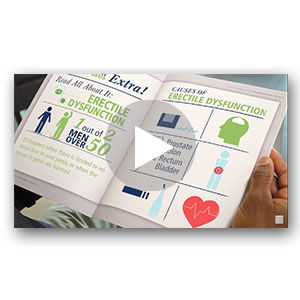Testicular Cancer Patient Guide
Detailed guide to include a patient story, symptoms, diagnosis and treatment for men as well as a section on children with testicular cancer.… more
Interstitial Cystitis/Bladder Pain Syndrome (IC/BPS)
Download this patient guide to learn more information about IC/BPS and the urinary tract.… more
Guide patient sur la cystite interstitielle (syndrome de la vessie douloureuse)
La cystite interstitielle (CI), ou syndrome de la vessie douloureuse (SVD), est un problème de douleur vésicale chronique. Cela peut évoquer une infection de la vessie ou infection urinaire, mais ce n’en est pas une. Il s’agit d’une sensation d’inconfort et de pression dans la région de la vessie qui dure six semaines ou plus, sans infection ni autre cause évidente. (Patient Guide to Interstitial Cystitis (Painful Bladder Syndrome))… more
શિશ્નોત્્થથાન અપક્રિયા (ઇરેક્્ટટા ઇલ ડિસફંકશન) અંગે દર્ દીની માર્ ્ગદર્્શ ન
અભ્્યયાસ દર્્શશાવે છે કે 50 વર્્ષથી વધુ ઉંમરના2માંથી 1 પુરુષમાં અમુક અંશે શિશ્નોત્્થથાન અપક્રિયા(ઇરેક્્ટટાઇલ ડિસફંકશન) (ED) હોય છે.વૃદ્ધાવસ્્થથા જ એકમાત્રકારણનથી પરંતુ પુરુષોની ઉંમર સાથે ED વધુ સામાન્્યબને છે. (Erectile Dysfunction Patient Guide)… more
આજે અતિસક્રિય મૂત્રાશય વિશે વાત કરવા નો સમય છે
યુનાઇટેડસ્્ટટેટ્્સમાં લાખોલોકોમૂત્રાશયની સમસ્્યયાઓનોસમૂહએવા અતિસક્રિય મૂત્રાશય (OAB) સાથે સંઘર્્ષકરી રહ્યાછે. OABમાં તમારુુંમૂત્રાશય ખરેખર ભરાયેલું ન હોય ત્્યયારે પણતમારા મૂત્રાશયને પેશાબ કરવાની તીવ્ર ઇચ્્છછાથાય છે. કેટલીકવાર એવું બને છે કે તમારુુંમૂત્રાશય અતિશય સંવેદનશીલબની જાય છે અને કેટલીકવાર એવું પણબને છે કે તમે તેને પરવાનગી ન આપોતોપણતે પેશાબ કરવાની છૂટઆપી દે છે. (Overactive Bladder Patient Guide)… more
ઇન્્ટર્્સ્ટટિશલ સિસ્્ટટીટીસ /બ્્લલૅડર પેઇન સિન્ડ્રોમ દર્દી માર્્ગદર્્શશિ કા
ઘણા લોકોને ઇન્્ટર્્સ્ટટિશિયલ સિસ્્ટટીટીસ(IC) અથવા બ્્લલૅડર પેઇન સિન્ડ્રોમ (BPS) - મૂત્રાશયમાં દુખાવોઅને પેશાબની તાકીદ અને આવર્્તન સહિતના લક્ષણોનું તબીબી નામ - તેનું નિદાન કરવામાં મહિનાઓ કે વર્ષો પણલાગે છે.સારા થવાનું પ્રથમ પગલું એ છે કે તમે બની શકે તેટલું વધુ શીખો.તમારા લક્ષણોને સમજોઅને વિવિધ સારવાર વિકલ્્પપોવિશે જાણો. (IC/BPS Patient Guide)… more
મૂત્રાશયના કૅન્્સરનાં દર્ દી માટેની માર્્ગદર્્શ શિકા
મૂત્રાશયનું કૅન્્સર ઘણીવાર મૂત્રાશયનાઅસ્્તરમાં શરૂ થાય છે.મોટાભાગનાકૅન્્સરની જેમ, મૂત્રાશયનાકૅન્્સરનું વહેલું નિદાન કરાવવાથી તમને વધુ સારવારનાવિકલ્્પપોઅને સારાપરિણામો મળી શકે છે. (Bladder Cancer Patient Guide)… more
ટેસ્્ટટિક્યુલર કૅન્્સરના દર્દીની માર્્ગદર્્શશિકા
ટેસ્્ટટિક્યુલર કૅન્્સર છોકરા અથવા પુરુષને કોઈપણઉંમરે થઈ શકે છે (નવજાતથી લઈને વૃદ્ધ સુધી), તે મોટાભાગે 15 થી 44 વર્્ષની વયના પુરુષોમાં જોવા મળે છે.વૃષણમાં કૅન્્સર વધ્્યયુુંછે તે જાણીને હંમેશા આઘાત લાગે છે, ખાસકરીને નાની ઉંમરે.જોકે, વહેલાંસર નિદાન વડે આ કૅન્્સરની સારવાર કરી શકાય છે અને સારુુંપણકરી શકાય છે.રાહન જોવી મહત્તત્વપૂર્્ણછે. (Testicular Cancer Patient Guide)… more
અસંયમ (ઇનકોન્્ટટિનન્્સ્ટસ) માટે દર્ દીની માર્્ગદર્્શશિકા
યુનાઇટેડ સ્્ટટેટ્્સમાં લાખો લોકો અસંયમ અને મૂત્રાશય નિયંત્રણના લક્ષણો સાથે જીવે છે.તે પુરુષો, સ્ત્રીઓ અને બાળકોને તેઓ ઈચ્્છછેતેવું જીવન જીવતા અટકાવે છે.બાથરૂમથી દૂર રહેવાનો ભય કાર્્યઅને અન્્યઘણી બાબતો કરવા વિશેની પસંદગીઓને મર્્યયાદિત કરી શકે છે. (Incontinence Patient Guide)… more
VUR દર્ દી માર્્ગદર્્શશિકા
ઘણા લોકોએ એસિડ રીફ્્લક્્સવિશે સાંભળ્્યુુંહશે. જ્્યયારે પેટમાં એસિડ વધે છે ત્્યયારે છાતીના ભાગે દુખાવો અથવા બળતરા થાય છે. શરીરમાં થતા રીફ્્લક્્સનો આ કંઈ એકમાત્ર પ્રકાર નથી. મૂત્રાશયમાં પણરીફ્્લક્્સહોઈ શકે છે, મૂત્રાશયના રીફ્્લક્્સમાં પેશાબ નીચે જવાને બદલે ઉપર જાય છે. જ્્યયારે પેશાબ મૂત્રાશયમાંથી કિડની તરફપાછળની તરફવહે છે ત્્યયારે તેને વેસિક્યુરેટરલરીફ્્લક્્સ(VUR) કહેવામાં આવે છે. (Vesicouretal Reflux (VUR) Patient Guide)… more
Guía para pacientes con cáncer testicular
Guía detallada que incluye la historia de un paciente, síntomas, diagnóstico y tratamiento para los hombres y una sección sobre niños con cáncer testicular. (Testicular Cancer Patient Guide)… more
Guía para pacientes Eyaculación precoz
La eyaculación precoz (EP) es cuando la eyaculación se produce antes de lo que un hombre o su pareja preferirían durante el sexo. La EP ocasional también se conoce como eyaculación rápida, clímax prematuro o eyaculación prematura. La EP tal vez no sea un motivo de preocupación. (Premature Ejaculation Patient Guide)… more
Guía para pacientes de VUR
El VUR se puede detectar antes de que nazca el niño. Pero comúnmente se diagnostica cuando un niño joven desarrolla una infección del tracto urinario. El VUR es poco frecuente en los niños mayores y los adultos. Alrededor de tres de cada cuatro pequeños que reciben tratamiento por VUR son niñas. (Vesicoureteral Reflux (VUR) Patient Guide)… more
Guía para pacientes: Testículos no descendidos
El testículo no descendido es el término utilizado cuando uno de los testículos o ambos no descienden al escroto. El pediatra del bebé puede detectar esto durante un examen de rutina. El escroto se ve y se siente vacío. (Undescended Testicles Patient Guide)… more
Disfunción eréctil Guía del paciente
Un folleto que brinda a los pacientes una descripción general de los síntomas, causas, diagnóstico y tratamiento de la disfunción eréctil. (Erectile Dysfunction Patient Guide)… more
Terapia con testosterona: Una guía para los pacientes
Esta guía informa a los pacientes lo que es la testosterona y lo que deben saber sobre la terapia con testosterona. (Testosterone Therapy)… more
Guía para pacientes con cáncer de vejiga
Esta guía le informará sobre el cáncer de vejiga y lo que puede hacer al respecto. (Bladder Cancer Patient Guide)… more
UrologyHealth extra® – Bladder Cancer Special Issue
Order this special issue focusing on bladder cancer to be shipped free in the United States and includes information for patients and caregivers on the basics such as the stages of this cancer, symptoms, treatments, risk factors and how to learn more.… more
UrologyHealth extra® – Bladder Cancer Special Issue
Download this special issue focusing on bladder cancer that includes information for patients and caregivers on the basics such as the stages of this cancer, symptoms, treatments, risk factors and how to learn more.… more
Women’s Health and Menopause – What You Should Know Fact Sheet
Learn about women’s health during perimenopause and menopause, symptoms and treatment options. … more
Women’s Health and Menopause – What You Should Know Fact Sheet
Order this fact sheet that includes information on perimenopause, menopause, symptoms and treatment options for women.… more
Constipation and Urine Control - What You Should Know Fact Sheet
This fact sheet outlines what to know about constipation and urine control. Constipation happens when you go too long without having a bowel movement & this can cause issues with urine control. … more
Constipation and Urine Control: What You Should Know
Order this fact sheet that outlines what to know about constipation and urine control. Constipation happens when you go too long without having a bowel movement & this can cause issues with urine control. … more
Ureteropelvic Junction (UPJ) Obstruction - What Parents Should Know Fact Sheet
Learn about Ureteropelvic Junction (UPJ) Obstruction, its causes, symptoms and common treatments.… more
Topical Estrogen – What You Should Know Fact Sheet
Women who have gone through menopause often have vaginal dryness. This problem is also common in those who have had both of their ovaries surgically removed. In some cases, vaginal dryness can lead to pain with sex, burning vaginal discomfort or itching, recurrent urinary tract infections (UTIs) or abnormal vaginal discharge. Topical estrogen is a prescription treatment that can help lower or ease these symptoms.… more
Bladder Exstrophy – What Parents Should Know Fact Sheet
Bladder exstrophy is a rare birth defect. On average, it occurs in about 1 out of every 50,000 live births. It is slightly more common in males than females. It is a condition where the bladder and parts around it form inside-out. … more
Adult Gender: What You Should Know
Learn about adult gender, gender affirmation and terms around gender.… more
Fertility Preservation and Gender Diverse Parenthood: What You Should Know
Learn about fertility preservation for gender diverse adults and frequently asked questions.… more
Adult Sexuality and Gender Diversity: What You Should Know
Learn about adult sexuality and gender diversity, sexual orientation, gender dysphoria and medical choices for gender diverse adults.… more
Adult Masculinizing Gender-Affirming Surgery: What You Should Know
Learn about gender affirmation, adult masculinizing gender-affirming surgery and questions to ask your doctor.… more
Adult Feminizing Gender-Affirming Surgery: What You Should Know
Learn about gender affirmation, adult feminizing gender-affirming surgery and questions to ask your doctor.… more
Bladder Cancer: What You Should Know
Learn more about the basics of bladder cancer including types, causes, symptoms, testing and treatment options. … more
Pelvic Floor Muscle Relaxing: What You Should Know
Strong pelvic floor muscles can help prevent leakage and calm the urge to pass urine. Sometimes these muscles can be too tight, which can cause urine leaks, trouble emptying your bladder and pain during sex.… more
Vasectomy Reversal
Download this fact sheet with information about vasectomy reversal. Vasectomy reversal is a procedure for men who have had a vasectomy and then decide they want to father a child.… more
Urine Color - What You Should Know
A fact sheet about the meaning behind the color of urine for people of all ages to know when to drink more, what can change urine color and when to talk with a doctor about urine color.… more
Interstitial Cystitis/Bladder Pain Syndrome (IC/BPS) Fact Sheet
Download this fact sheet to read a concise review of interstitial cystitis/bladder pain syndrome.… more
Hypospadias – What Parents Should Know
A short summary of Hypospadias, including signs, diagnosis, treatments and questions to ask your child’s doctor.… more
Varicoceles - What You Should Know
Designed for teen boys and men to explain this condition, causes, treatments and address frequently asked questions.… more
Bedwetting in Children: What Parents Should Know Fact Sheet
Download this fact sheet.… more
Urinary Tract Infections What You Should Know
A description of urinary tract infections to include tips on how to prevent UTIs.… more
Pediatric Urology Basics
The basics about urinary function in children with notes section to help patients, parents and health care teams.… more
Reproductive Basics
The basics about reproductive function in men as well as penile and testicular cancer with notes section to help patients and health care teams. … more
L’énurésie chez l’enfant: Ce que les parents doivent savoir
Il est question d’énurésie nocturne lorsqu’un enfant urine involontairement pendant son sommeil. C’est ce qu’on appelle communément faire pipi au lit. Plus de cinq millions d’enfants aux États-Unis ont des problèmes d’énurésie. (Bedwetting – What Parents Should Know Fact Sheet)… more
OEstrogènes topiques: Ce qu’il faut savoir
Les femmes ménopausées présentent souvent une sécheresse vaginale. Ce problème est également fréquent chez celles qui ont subi une ablation chirurgicale des deux ovaires. Dans certains cas, la sécheresse vaginale peut entraîner des douleurs lors des rapports sexuels, une sensation de brûlure ou des démangeaisons vaginales, des infections urinaires (IU) récurrentes ou des pertes vaginales anormales. (Topical Estrogen – What You Should Know Fact Sheet)… more
Détente des muscles du plancher pelvien: Ce qu’il faut savoir
Un plancher pelvien musclé peut aider à prévenir les fuites et à calmer l’envie d’uriner. Parfois, ces muscles peuvent être trop tendus, ce qui peut entraîner des fuites urinaires, des difficultés à vider la vessie et des douleurs pendant les rapports sexuels. (Pelvic Floor Muscle Relaxing – What You Should Know Fact Sheet)… more
Renforcement des muscles du plancher pelvien: Ce qu’il faut savoir
Des millions de personnes souffrent d’incontinence urinaire (fuites d’urine). Elles ont souvent l’impression que leur vie est soumise au bon vouloir de leur vessie. Mais ce n’est pas une fatalité. Vous pouvez agir dès maintenant pour mieux contrôler votre vessie. (Pelvic Floor Muscle Strength – What You Should Know Fact Sheet)… more
Cancer du testicule: Ce qu’il faut savoir
Le cancer du testicule survient lorsque les cellules du testicule se développent pour former une tumeur. Ce phénomène est rare. Plus de 90 % des cancers du testicule commencent dans les cellules germinales, qui produisent les spermatozoïdes. (Testicular Cancer – What You Should Know Fact Sheet)… more
Varicocèles: Ce qu’il faut savoir
Le terme varicocèle désigne une dilatation du groupe de veines situées à l’intérieur du scrotum (le sac qui contient les testicules) en raison d’une mauvaise circulation sanguine. (Varicoceles – What You Should Know Fact Sheet)… more
પેલ્્વવિક ફ્્લલો ર સ્્નના યુની મજબૂતાઇ તમારે શું જાણવું જોઇએ
લાખો લોકો પેશાબના અસંયમ (પેશાબ લીકેજ)થી પીડાય છે. ઘણીવાર લોકોને એવું લાગે છે કે તેઓનું મૂત્રાશય તેઓના જીવનને નિયંત્રિત કરે છે કે કેમ. પરંતુ આ તમારી કહાની ન હોવી જોઇએ. તમે તમારા મૂત્રાશયને નિયંત્રિત કરવામાં મદદ માટે પગલાં લઈ શકો છો. (Pelvic Floor Strengthening – What You Should Know Fact Sheet)… more
મૂત્ર માર્્ગના ચેપ તમારે શું જાણવું જોઇએ
મૂત્ર માર્્ગનો ચેપ (UTI) એટલે મૂત્રપિંડ, મૂત્રવાહિનીઓ, મૂત્રાશય અથવા મૂત્રમાર્્ગ - મૂત્ર પ્રણાલિના કોઇપણ ભાગમાં થતો બૅક્્ટટેરિયાનો ચેપ. મૂત્રાશયનો ચેપ એ ચેપનો સૌથી સામાન્્યપ્રકારછે. (Urinary Tract Infections – What You Should Know Fact Sheet)… more
હિમેટુરિયા (પેશાબ વાટે લોહી પડવું) તમારે શું જાણવું જોઇએ
હિમેટુરિયા એટલે પેશાબમાં લોહી આવવું. જ્્યયારે પેશાબ લાલ અથવા ગુલાબી રંગનો દેખાય ત્્યયારે તે પેશાબમાં લોહી આવવા સાથે સંકળાયેલ હોઈ શકે છે અને તેને "ગ્રોસ" અથવા "દૃશ્્યમાન" હિમેટુરિયા કહેવામાં આવે છે. કેટલીક વખત, પેશાબમાં લોહી હોય છે પરંતુ તે સહેલાઇથી દેખાતું નથી અને તેને "માઇક્રોસ્્કકોપિક” હિમેટુરિયા કહેવામાં આવે છે કારણ કે તે ફક્્તમાઇક્રોસ્્કકોપ હેઠળ જ દેખાઇ શકે છે. (Hematuria – What You Should Know Fact Sheet)… more
પેલ્્વવિક ફ્્લલોર સ્્નનાયુનું ઢીલા થવું તમારે શું જાણવું જોઇએ
પેલ્્વવિક ફ્્લલોર એ સ્્નનાયુઓનું એક જૂથ છે જે મૂત્રમાર્્ગની ફરતે હોય છે (એ નળી જેમાંથી પેશાબ પસાર થાય છે). જ્્યયારે તે કડક થાય છે ત્્યયારે તે પેશાબનાલિકેજને રોકવામાં મદદ કરે છે. મજબૂત પેલ્્વવિક ફ્્લલોરનાં સ્્નનાયુઓ લીકેજ (ચૂવાક)ને રોકવામાં મદદરૂપ થઈ શકે છે અને પેશાબ પસાર કરવાની ઇચ્્છછાને શાંત કરે છે. (Pelvic Floor Relaxing – What You Should Know Fact Sheet)… more
બાળકોમાં પથારી ભીની થવી માતા-પિ તાએ શું જાણવું જોઈએ
જ્્યયારે બાળકો ઊંઘમાં નિયંત્રણ વગર પેશાબ કરે છે, તેને નૉક્્ટર્્નલ એનુરેસીસ (nocturnal enuresis) કહેવામાં આવે છે. તે બેડ વેટિંગ તરીકે પણ જાણીતું છે. યુ.એસ.માં 50 લાખથી વધુ બાળકોને બેડ વેટિંગની સમસ્્યયા છે. (Bedwetting – What Parents Should Know Fact Sheet)… more
યુરેટેરોપેલ્્વવિક જંકશન (UPJ) અવરોધ માતા-પિતાએ શું જાણવું જોઈએ
યુરેટેરોપેલ્્વવિક જંકશન (UPJ) અવરોધમાં કિડનીનો ભાગ અવરોધિત થાય છે. મોટેભાગે તે રીનલ પેલ્્વવિસ (બસ્્તતિપ્રદેશ) પર અવરોધિત થાય છે. આ એ જગ્્યયાછે જ્્યયાાંકિડની યુરીટર (મૂત્રવાહિની) (પેશાબને મૂત્રાશયમાં લઈ જતી નળીઓ)માંથી એક સાથે જોડાય છે. (UPJ – What Parents Should Know Fact Sheet)… more
પ્રજનન તંત્રની મૂળભૂત માહિતી
પુરુષો માટે, યુરોલૉજીમાં મૂત્ર માર્્ગ અને પુરૂષ પ્રજનન અંગોનો સમાવેશ થાય છે, અથવા, તમે તેને કમરની નીચેની પ્રણાલીઓ કહી શકો છો. (Reproductive Basics Fact Sheet)… more
ਬੱਚਿਆਂ ਵਿੱਚ ਯੂ.ਟੀ.ਆਈ. ਲਈ ਫੈਕਟ ਸ਼ੀਟ
ਇੱਕ ਸµਖੇਪ ਸਮੀਖਿਆ ਜੋ ਦੱਸਦੀ ਹੈ ਕਿ ਮਾਪਿਆਂ ਨੂੰ ਯੂਰਿਨਰੀ ਟ੍ਰੈਕਟ ਇਨਫੈਕਸ਼ਨਜ਼ ਬਾਰੇ ਕੀ ਕੁੱਝ ਜਾਣਨ ਦੀ ਜ਼ਰੂਰਤ ਹੈ। (UTIs in Children - What Parents Should Know Fact Sheet)… more
ਯੂਰਿਨਰੀ ਟ੍ਰੈਕਟ ਇਨਫੈਕਸ਼ਨ- ਬਚਾਅ ਲਈ ਫੈਕਟ ਸ਼ੀਟ
ਯੂ.ਟੀ.ਆਈ. ਨੂੰ ਕਿਵੇਂ ਰੋਕਿਆ ਜਾਵੇ, ਇਸ ਦੇ ਸੁਝਾਅ ਨੂੰ ਯੂਰਿਨਰੀ ਟ੍ਰੈਕਟ ਇਨਫੈਕਸ਼ਨ ਦੇ ਵੇਰਵੇ ਵਿੱਚ ਸ਼ਾਮਲ ਕੀਤਾ ਗਿਆ ਹੈ। (UTI Prevention Fact Sheet)… more
ਇਰੇਕਟਾਈਲ ਡਿਸਫµਕਸ਼ਨ - ਸਹੀ ਚੋਣ: ਇਰੈਕਸ਼ਨ ਸਮੱਸਿਆਵਾਂ ਦਾ ਇਲਾਜ਼
ਇਸ ਸਥਿਤੀ ਲਈ ਮੈਡੀਕਲ ਅਤੇ ਸਰਜੀਕਲ ਵਿਕਲਪਾਂ ਸਮੇਤ ਈ.ਡੀ. ਦਾ ਇੱਕ ਸµਖੇਪ ਵੇਰਵਾ। (Choosing Wisely - Treatment for Erection Problems Fact Sheet)… more
Control de la vejiga Herramienta de evaluación
Lea las preguntas de ambas páginas y respóndalas en función del último mes. Muestre la evaluación completa a su médico. Las respuestas de esta evaluación pueden ayudarle a medir sus síntomas y cuánta molestia le causan. (Bladder Control Assessment Tool)… more
Diario miccional Herramienta de evaluación
Un diario miccional es una herramienta de evaluación que puede usar con su médico para comprender mejor sus síntomas de incontinencia urinaria. (Bladder Diary Assessment Tool)… more
Prolapso de vejiga Lo que debe saber
La mayoría de las veces, la vejiga se mantiene en su lugar gracias a los músculos y el tejido de sostén del suelo pélvico que actúan como una “hamaca”. El prolapso de vejiga ocurre cuando estos tejidos se estiran y se debilitan. En las mujeres, la vejiga puede caerse y sobresalir a través de esta capa de músculos hacia la vagina. (Bladder Prolapse – What You Should Know Fact Sheet)… more
Nocturia Lo que debe saber
Si se despierta dos o más veces por noche para ir al baño, ese es un signo claro de nocturia. Despertarse durante la noche para ir al baño puede ser difícil de sobrellevar. La nocturia puede alterar el sueño y afectar su calidad de vida. La nocturia es una señal de que algo preocupante está sucediendo en nuestros cuerpos. No es una enfermedad en sí misma. (Nocturia – What You Should Know Fact Sheet)… more
Preservación de la fertilidad y concepción en personas de género diverso: Lo que debe saber
Aprenda sobre preservación de fertilidad para adultos con diversidad sexual y preguntas frecuentes sobre este tema. (Fertility Preservation and Gender Diverse Parenthood: What You Should Know… more
Obstrucción de la union pieloureteral (UPU) - Lo que deben saber los padres
La obstrucción de la unión pieloureteral (UPU) se produce cuando una parte del riñón está bloqueada. La obstrucción suele estar en la pelvis renal. (Ureteropelvic Junction (UPJ) Obstruction - What Parents Should Know Fact Sheet)… more
Cistitis intersticial / síndrome de vejiga dolorosa: Lo que debe saber
La cistitis intersticial (CI) o síndrome de vejiga dolorosa (SVD) es un problema de dolor prolongado de la vejiga. No es una infección, pero parece una por los síntomas. Es una sensación de malestar y presión en el área de la vejiga. (Interstitial Cystitis/Bladder Pain Syndrome – What You Should Know Fact Sheet)… more
Guía para pacientes con cistitis intersticial / síndrome de vejiga dolorosa
Muchas personas tardan meses o incluso años en recibir un diagnóstico de cistitis intersticial (CI) o síndrome de vejiga dolorosa (SVD), los nombres médicos para el complejo de síntomas que incluyen dolor en la vejiga, necesidad imperiosa de orinar y aumento del número de micciones. (Interstitial Cystitis/Bladder Pain Syndrome Patient Guide)… more
Incontinencia urinaria en niños: Lo que deben saber los padres
Se habla de enuresis nocturna cuando los niños expiden orina sin control mientras duermen. También se conoce como incontinencia urinaria. (Bedwetting in Children: What Parents Should Know Fact Sheet)… more
Extrofia vesical - Lo que deben saber los padres
La extrofia vesical es un defecto congénito poco frecuente. En promedio, ocurre en 1 de cada 50 000 nacidos vivos. Es ligeramente más común en hombres que en mujeres. Es una afección en la que la vejiga y las partes que la rodean se forman al revés. (Bladder Exstrophy – What Parents Should Know Fact Sheet)… more
Infecciones del tramo urinario ¿Qué debe saber?
Una infección del tramo urinario (ITU) es una infección bacteriana en cualquier parte del sistema urinario – los riñones, la vejiga o la uretra. El tipo más común es la infección en la vejiga.… more
Sexualidad y diversidad de género en los adultos: Lo que debe saber
Aprenda sobre la sexualidad adulta, la diversidad sexual, la orientación sexual, el concepto de disforia de género y opciones médicas para adultos con diferentes identidades sexuales. (Adult Sexuality and Gender Diversity: What You Should Know)… more
Cirugía de reafirmación de género masculinizante: Lo que debe saber
Aprenda sobre la identidad de género, la cirugía de reasignación de genero masculina o masculinización y preguntas para realizar a su médico/médica. (Adult Masculinizing Gender-Affirming Surgery: What You Should Know)… more
Cirugía de reafirmación de género feminizante: Lo que debe saber
Aprenda sobre la identidad de género, la cirugía de reasignación de genero femenina o feminización y preguntas para realizar a su médico/médica. (Adult Feminizing Gender-Affirming Surgery: What You Should Know)… more
El género en los adultos: Lo que debe saber
Aprenda sobre el género en los adultos, la identidad de género y otros términos relacionadas con el género. (Adult Gender: What You Should Know)… more
Eyaculación precoz: Lo que debe saber
La eyaculación precoz (EP) es cuando la eyaculación se produce antes de lo que un hombre o su pareja preferirían durante el sexo. La EP tal vez no sea un motivo de preocupación. Sin embargo, puede ser frustrante si hace que el sexo sea menos agradable y afecta las relaciones. Si sucede con frecuencia y causa problemas, su médico puede ayudar. (Premature Ejaculation: What You Should Know Fact Sheet)… more
Enfermedad de Peyronie o pene curvado: Lo que debe saber
La enfermedad de Peyronie se produce por la forma en que el cuerpo de una persona cicatriza las heridas. Las lesiones o los daños en el tejido externo del pene provocan la formación de tejido similar a una cicatriz (placa). Esta cicatrización tarda mucho más que el proceso normal de cicatrización. (Peyronie’s Disease: What You Should Know Fact Sheet)… more
Terapia de testosterone: Lo que debe saber
La testosterona es la hormona del sexo masculino producida en los testículos. Los niveles de la hormona testosterone son importantes para un funcionamiento y desarrollo sexual masculino normal. Esta hormona ayuda a los varones a desarrollar cualidades masculinas, como el vello facial y corporal, la voz grave y la fortaleza muscular. Además, los hombres necesitan testosterona para producir esperma. (Testosterone Therapy: What You Should Know Fact Sheet)… more
Reflujo vesicoureteral - Lo que los padres deben saber
Con RVU la orina viaja en dirección contraria hacia los riñones a traves de los ureteres. Puede presentarse en unoo los dos ureteres. Hay una classification del reflujo que va desde grado 1 hasta 5. El grado 5 es el mas severo. (Vesicoureteral Reflux (VUR) - What Parents Should Know Fact Sheet)… more
Varicocele: Lo que debe saber
Un varicocele se forma cuando el grupo de venas dentro del escroto (el saco que contiene a los testículos) se agranda debido al flujo sanguíneo insuficiente. Estas venas conforman el plexo pampiniforme. (Varicoceles: What You Should Know Fact Sheet)… more
Las ITU en los niños: Lo que deben saber los padres
Una infección del tracto urinario (ITU) se produce por una bacteria que infecta el tracto urinario (los órganos y conductos en nuestro cuerpo que producen, almacenan y expulsan la orina). El tracto urinario se compone de los riñones, los uréteres, la vejiga y la uretra. (UTIs in Children - What Parents Should Know Fact Sheet)… more
Testículo no descendido: Lo que deben saber los padres
El testículo no descendido es el término utilizado cuando uno de los testículos o ambos no descienden en su lugar. El escroto se ve y se siente vacío. La mayoría de las veces no se presentan otros problemas. El nombre científico es criptorquidia. (Undescended Testicles: What Parents Should Know Fact Sheet)… more
Hipospadias: Lo que los padres deben saber
El hipospadias es una afección presente desde el nacimiento. Sucede cuando la abertura de la uretra (el orificio por donde sale la orina) se encuentra en la parte inferior del pene en lugar de estar en la punta. La ubicación de la abertura de la uretra servirá para decidir la forma en que el equipo de cuidados de su hijo solucionará el inconveniente. (Hypospadias: What Parents Should Know Fact Sheet)… more
Circuncisión: Lo que deben saber los padres
Los padres de niños recién nacidos tienen la opción de elegir con respecto a la circuncisión. En EE. UU., no hay leyes o normas sobre la circuncisión, por lo que es una lección para los padres. Antes de tomar la decisión, los padres deben aprender sobre la circuncisión y hablarlo con el médico. (Circumcision: What Parents Should Know Fact Sheet)… more
Control de la vejiga en los niños: Lo que deben saber los padres
La disfunción vesical describe una serie de problemas con la forma en que la vejiga retiene y libera la orina, lo que, a veces, puede resultar en accidentes de incontinencia urinaria. (Bladder Control Problems in Children: What Parents Should Know Fact Sheet)… more
Hematuria: Lo que debe saber
La hematuria es la presencia de sangre en el orine. Cuando el orine es de color rojo o rosado, esto puede estarrelacionado con sangre en el orine y se llama hematuria "macroscópica" o "visible". (Hematuria: What You Should Know Fact Sheet)… more
Estrógeno tópico Lo que debe saber
Las mujeres menopáusicas generalmente experimentan sequedad vaginal. El problema también es común en mujeres a quienes se les han extirpado los ovarios en una cirugía. En algunos casos, la sequedad vaginal puede causar dolor durante las relaciones sexuales, incomodidad vaginal dolorosa o picazón, infecciones del tracto urinario (ITU) recurrentes o flujo vaginal anormal. El estrógeno tópico es un tratamiento recetado que puede ayudar a disminuir o aliviar estos síntomas. (Topical Estrogen – What You Should Know Fact Sheet)… more
Bases de la Reproduccion
En los hombres, la urología incluye el tracto urinario y los órganos del sistema reproductivo, o, también se podrían pensar como los órganos abajo del cinturón.… more
Disfunción eréctil: Salud sexual para los sobrevivientes del cáncer
Descripción de las causas de la disfunción eréctil en algunos hombres después del tratamiento del cáncer y un análisis de las opciones de tratamiento.… more
Cáncer testicular - Lo que debe saber
Un análisis conciso para ayudar a los jóvenes a entender el cáncer testicular y la importancia de la autoexploración testicular. (Testicular Cancer - What You Should Know Fact Sheet)… more
Cáncer testicular: Lo que debe saber
El cáncer testicular se produce cuando las células del testículo crecen para formar un tumor. Esto es poco frecuente. Más del 90 % de los cánceres testiculares comienzan en las células germinales, que producen esperma. (Testicular Cancer: What You Should Know Fact Sheet)… more
Urología pediátrica - Transicion de la atencion medica pediatrica al adulto
Cuando un paciente cambia su equipo médico por otro esto se conoce como transición del cuidado médico. el objetivo es que para el paciente sea un cambio lo más simple posible sin limitaciones al acceso médico durante este cambio. (Pediatric Urology - Transitioning from Pediatric to Adult Care Fact Sheet)… more
Urología pediátrica - Lo que debería saber
La urología es un área especial de la medicina que se centra en la función de los sistemas urinario y reproductivo y en cómo esos sistemas se formaron y crecieron antes y después del nacimiento.… more
Principios Basicos en Pediatria
El Sistema urinario produce, almacena y elimina desechos producidos por el cuerpo en la forma de orina. El Sistema esta compuesto por los riñones, ureters, vejiga y uretra.… more
Disfunción eréctil: Salud sexual para los sobrevivientes del cáncer
Descripción de las causas de la disfunción eréctil en algunos hombres después del tratamiento del cáncer y un análisis de las opciones de tratamiento. … more
Disfunción eréctil: Opciones de tratamiento
Descripción concisa de la disfunción eréctil; incluye opciones médicas y quirúrgicas para esta afección.… more
Disfunción eréctil: Prevención
Descripción de la disfunción eréctil; incluye causas y maneras de prevenir la disfunción eréctil.… more
Guía informativa sobre la disfunción eréctil
Guía informativa que explica todo lo que deberían saber los pacientes sobre la disfunción eréctil.… more
Disfunción eréctil: Diagnóstico
Resumen de la disfunción eréctil; incluye información sobre cómo se diagnostica esta afección. … more
Disfunción eréctil Elegir sabiamente: tratamiento para problemas de erección
Disfunción eréctil Elegir sabiamente: tratamiento para problemas de erección.… more
Bladder Basics
The basics about bladder function and bladder cancer with notes section to help patients and health care teams. … more
Básicos Sobre la Vejiga
La vejiga es un órgano hueco con forma de globo. Está compuesta principalmente de músculos. Almacena la orina hasta que usted esté listo para ir al baño a liberarla. La vejiga le ayuda a orinar. La orina sale del cuerpo a través de la uretra.… more
Bladder Cancer: Get the Facts
Did you know bladder cancer is the 10th most common cancer in the world? This patient education video from the Urology Care Foundation will tell you all of the facts you need about bladder cancer. … more
Infección del Tracto Urinario (ITU / UTI): Preguntas Más Comunes
Hoy vamos a responder algunas de las preguntas más frecuentes sobre infecciones de las vías urinarias (ITU). También conocidas por sus siglas en ingles "urinary tract infection" o “UTI”.… more
¿Qué es la Disfunción Eréctil (DE)?
No es fácil hablar sobre la disfunción eréctil o DE — pero es uno de los problemas sexuales más comunes que los hombres reportan a su médico. DE es cuando un hombre tiene dificultad para obtener o mantener una erección lo suficientemente firme para tener relaciones sexuales. Es un problema bastante común, que afecta a 1 de cada 2 hombres mayores de 50 años. Pero puede afectar a hombres de cualquier edad.… more
Obtenga la Información Sobre el Reflujo Vesicoureteral (RVU)
A medida que su hijo crece, la salud urológica es muy importante para el desarrollo general. Una condición común que afecta a los niños es el reflujo vesicoureteral. Su urólogo pediatra se referirá a esta condición como “reflujo” como un término alterno de manera corta.… more
Aprenda Datos Sobre La Enfermedad de Peyronie
La enfermedad de Peyronie es incómoda y ocurre por la presencia de tejido cicatricial que forma una placa debajo de la piel a nivel del pene. Estas placas se forman y se asocian a la creació de direcciones anguladas y dolorosas. … more


